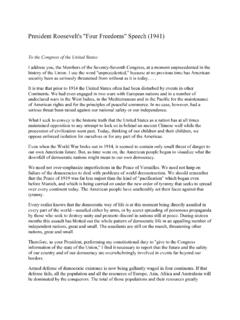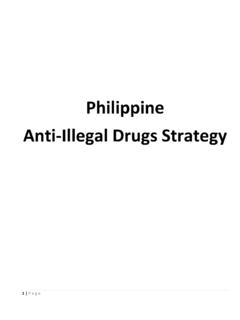Transcription of IAANI
1 Conference Program January 3 - 5, 2022 International Symposium on Autoethnography and NarrativeIAANII nternational Association of Autoethnography and Narrative Inquiry 1 Welcome to the 2022 International Symposium on Autoethnography and Narrative At last year s conference (January 2021), many of us hoped to return this January to the Dolphin Beach Resort in St. Pete Beach, Florida (USA). But COVID-19 continues to complicate in-person affairs. Yet here we are again, virtually, carrying on and going forth with more than 150 prerecorded presentations of autoethnographic and narrative research, nearly double compared to last year (87). All of these presentations are linked throughout this program. We also have one keynote, four workshops, and 11 spotlight sessions. As of this writing, more than 300 people have registered for the conference, and we have participants affiliated with more than twenty countries, including Argentina, Nepal, Denmark, Israel, Lebanon, Egypt, England, the United States, Mexico, Canada, Australia, Japan, Colombia, Brazil, Scotland, Wales, India, Uruguay, Netherlands, Taiwan, Poland, Germany, and New Zealand.
2 At our previous conference, we also learned several benefits of the online format: the prerecorded presentations, especially those hosted on YouTube, offer closed captioning, transcription, and even some translation. Viewers can watch and re-watch the presentations when convenient. Although most of this year s presentations are in English, with the leadership of Silvia B nard, we have included several presentations in Spanish as well. In addition to you the participants who make this virtual gathering possible several others have contributed directly to the creation of this year s conference (listed alphabetically): Bryant Keith Alexander, Amy Arellano, Silvia B nard, Keith Berry, Kakali Bhattacharya, Wendy Bilgen, Arthur Bochner, Robin Boylorn, LaVette Burnette, David Carless, Hande ayir, Cody Clemens, Norman Denzin, David Dooling, Kitrina Douglas, Carolyn Ellis, Dawne Fahey, Sandra Faulkner, Renata Ferdinand, Ragan Fox, Mark Freeman, Ken Gergen, Craig Gingrich-Philbrook, Alec Grant, Himanee Gupta-Carlson, Dan Harris, Donna Henson, Stacy Holman Jones, Fetaui Iosefo, Christina Ivey, Alexis Johnson, Susan Krieger, Marquese McFerguson, Csaba Osvath, dipbuk Panchal, Sandra Pensoneau-Conway, Elyse Pineau, Chris Poulos, David Purnell, Rishi Raj, Robert Rinehart, Lisa Spinazola, Phiona Stanley, Mary E.
3 Weems, Yolandi Woest, Jonathan Wyatt, and Donna Harp Ziegenfuss. Thank you all. We hope you enjoy this year s conference and that you will participate in the 2023 ISAN (January 3-5, 2023). We hope to come together again in-person in Florida (USA), though we will also include a virtual component to the conference. More information about the 2023 ISAN, including the call-for-submissions, will be released on (May 2022). There are three conference sessions for each time slot: one session in Zoom Room A, one session in Zoom Room B, and one session in Zoom Room C. The Zoom links are active only for those who register for the conference. To register for the conference, visit Based on the feedback from last year s conference, we have also designated several sessions as social rooms. These rooms offer registrants additional time to discuss their projects, meet after conference sessions, share ideas, etc.
4 You can join these rooms at any time, and there is no agenda or moderator for these sessions. Use these rooms to chat, meet, network, and relax! 2 Workshops On January 3, 2022, ISAN will host four workshops. The workshop times and descriptions are below. These workshops will take place live via Zoom; they will not be recorded. To participate in the workshops, there is an additional $25 registration fee. To register for the workshops, visit The links for the workshops will only be sent to those who have registered for the workshops. Workshop 1 Monday, January 3 9:00am-10:45am (EST) Collaborative Writing as Inquiry Jonathan Wyatt, University of Edinburgh (Scotland) This workshop takes up Braidotti s proposition to explore how collaborative writing like breathing, [is] not held into the mould of linearity, or the confines of the printed page, but move[s] outwards, out of bounds, in webs of encounters with ideas, others, texts (Braidotti, 2013, p.)
5 166). In other words, it will work with the view that collaborative writing as inquiry is a political act, a minor gesture (Manning, 2016), a world-making that opens up to the new and challenges the sedimented; an act of activism (Madison, 2010). I will provide participants with the opportunity both to engage with and perhaps engage in collaborative writing. We will work with ideas of what collaborative writing as inquiry might be, with what it can do, and consider its potential as activist research and pedagogic practice. I will talk through examples of key collaborative writing texts, approaches and scholars ( Jane Speedy, Bronwyn Davies, Susanne Gannon) and offer practical suggestions, including concerning the ethics of collaborative inquiry. Braidotti, R. (2013). The Posthuman. Polity. Madison, D. S. (2010) Acts of activism: Human rights as radical performance.
6 Cambridge University Press. Manning, E. (2016). The minor gesture. Duke University Press Workshop 2 Monday, January 3 11:00am-12:45pm (EST) Weaving Together Research, Poetics, and the Personal Marquese McFerguson, Florida Atlantic University This workshop offers participants the opportunity to explore the ways in which autoethnographers and musicians who create autoethnographic compositions use poetry and poetics (extended metaphors, repetition, imagery, etc.) to strengthen their writing, paint vivid pictures for their audiences, and create evocative narratives that examine personal lived experiences through a social, political, and cultural lens. By studying how these writers use poetics, and participating in scripted writing exercises, workshop participants will increase the stylistic approaches/possibilities they have at their disposal when creating autoethnographic research and learn strategies to enhance their creativity during the writing process.
7 3 Workshop 3 Monday, January 3 1:00pm-2:45pm (EST) Fragmented Whole: Lessons from Creative, Critical, and Contemplative Approaches to Autoethnographic and Narrative Writing Kakali Bhattacharya, University of Florida While it is well established that the personal is political through the works of feminists of color, it is essential to note that the personal, political, and professional are deeply entangled. Those located at these entangled points find it necessary to fragment themselves due to multiple interconnected forces of oppression. Within academia, such fragmentation creates separation in our interiority, leading to a performativity that does not always integrate the cognitive, affective, and spiritual aspects of our realities and experiences. In this workshop, I will trace my journey of lessons learned when I engaged in calling back the fragmented parts through creative, critical, and contemplative approaches for myself and other academics whom I mentored.
8 Workshop attendees will experience some features of this journeying through interactive, embodied exercises and resources to take home to deepen their inner journeys and epiphanies. In a world that is becoming more divisive politically, religiously, economically and a terrain of higher education that is fraught and lumpy, it is critical that we create a presence that is agentic, grounded, and as unfragmented as possible, so that we may forge complex frameworks of solidarities across different identities, agendas, and bring forth much needed healing of the individual and collective mind, body, and spirit. Workshop 4 Monday, January 3 3:00pm-4:45pm (EST) Duoautoethnography as Perspective by Incongruity Amy Arellano, Boise State University Christina Ivey, Boise State University Critiques of autoethnography have often labeled the method navel-gazing a term meant to demean autoethnographic scholarship as being fraught with self-aggrandizing gestures that reveal personal truths instead of communal knowledge.
9 As scholar/activists who have both written duoautoethnographies and were trained as rhetoricians, we see the benefits of intertwining the two methods (autoethnography and rhetorical studies) as a way to create a space that highlights the evocative nature of narrative inquiry. Specifically in this workshop, we will dive into Kenneth Burke s notion of Perspective by Incongruity. Burke (1941) defines this as a rational prodding or coaching of language so as to see around the corner of everyday usage (p. 400). Put simply, Perspective by Incongruity places two different (potentially oppositional) stances into conversation so as to create a third space of understanding. We see duoautoethnography (DAE) as a mechanism to achieve what Burke set out to generate with Perspective by Incongruity. As such, we define DAE as a juxtaposition of individual narratives, brought together to see around the corner of a lone perspective.
10 In doing so, we can use autoethnography not as a tool of criticism, but as an approach to bring us closer to a communal knowledge. This workshop will first elucidate a (brief) understanding of Perspective by Incongruity; in particular, how it relates to duoautoethnography as method and practice. We will then guide participants through a series of activities and shared interactions meant to produce new insight into their experiences. Finally, we will share practical advice for utilizing this approach as a research tool and publication method. 4 8:45am (EST) Tuesday, January 4 Zoom Room A Meeting ID: 857 5591 8027 Passcode: ISAN Welcome to ISAN 2022! Tony Adams, Bradley University 9:00-9:50am (EST) Tuesday, January 4 Zoom Room A Meeting ID: 857 5591 8027 Passcode: ISAN Keynote Address 1. Taking it Home Kitrina Douglas, University of West London & Leeds Beckett University David Carless, University of the West of Scotland 10:00-10:50am (EST) Tuesday, January 4 Zoom Room A Meeting ID: 857 5591 8027 Passcode: ISAN 2.




